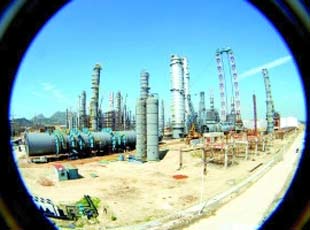Channeling Frustration
Beijing Review, July 11, 2013 Adjust font size:
China's largest oil and natural gas producer PetroChina published a report on the environmental impact assessment it submitted to the government for its controversial refinery in Kunming, capital of southwest China's Yunnan Province.
According to the June 25 report, available on the official website of PetroChina's parent company China National Petroleum Corp. (CNPC), the project uses cutting-edge pollution control technologies and its potential environmental impacts are acceptable.
The refinery, located in Anning, a county-level city administered by Kunming, has a designed annual processing capacity of 10 million tons and is expected to start operation in 2014 to address an urgent need to boost development in the predominantly rural province.
Yunnan is located far from existing refineries and oil production bases in China. In 2012, the province consumed a total of 95 million tons of refined oil transported from other parts of China. The local government estimated that the demand gap would rise to 12 million tons in 2015. In 2007, local media even reported city-wide traffic jams caused by vehicles queuing for fuel.
However, many local residents have opposed the planned refinery for environmental safety concerns. Critics alleged that a byproduct project affiliated with the development of the refinery would have produced 650,000 tons of paraxylene (PX) per year.
PX is a carcinogenic petrochemical used to create raw materials for the production of polyester film and fabrics. It is in great need in China. The country contributes around 20 percent of global PX output each year, but 40 percent of China's PX materials are imported, national broadcaster China Central Television reported.
On May 4, thousands of residents in Kunming gathered in the city center to express their objections using banners reading "No PX" and "Keep the Spring City Alive."
Hu Jingke, General Manager of CNPC's Yunnan subsidiary, said at a joint press conference with the Kunming Municipal Government on May 10 that the project has no PX facilities, nor will it produce PX products.
"The government will call off the project if most of our citizens say no to it," said Kunming Mayor Li Wenrong.
Environmental campaigns
Repeated protests against industrial projects with environmental risks have erupted in China.
Local residents took to the streets to protest against PX facilities planned in Xiamen in Fujian Province and Ningbo in Zhejiang Province in 2007 and 2012, respectively, forcing local governments to abandon the projects.
Protests in Shifang in Sichuan Province last June and July prompted the local government to cancel plans to construct a molybdenum-copper alloy factory.
Similarly, objections of residents of Qidong City, Jiangsu Province, forced the local government to permanently abandon plans for a Japanese-invested papermill last July. Local residents were concerned that wastewater from the project would pollute the sea.
"Environmental pollution has grown to be another important trigger of mass protests in China only after illegal land acquisition and labor disputes," said Shan Guangnai, a senior research fellow with the Chinese Academy of Social Sciences.
As a matter of fact, most unwelcome projects that met with public opposition had potential to become significant contributors to local tax revenue, furthering people's doubts regarding the local government's role in the disputes.
For example, a PX plant invested by Fujia Chemicals in Dalian, Liaoning Province, which was forced to move out of the city in 2011 due to protests, had projected annual revenues of 26 billion yuan (US$4.23 billion) and could have paid 2 billion yuan (US$326 million) in taxes per year. The molybdenum-copper alloy factory planned in Shifang could have produced more than 50 billion yuan (US$8.14 billion) in annual sales once completed.
He Yanling, a professor at the School of Governance of Sun Yat-sen University in Guangzhou, Guangdong Province, said that as for for-profit facilities like PX plants, the local government, which represents the interests of local residents, should negotiate with companies to fight for residents' compensation. She said that it is a shame that most local governments failed to stick to this stand as they are pressured to maintain high economic growth and often see themselves as representatives of invested companies.
Environmentalists and legal scholars have called on the government to establish an effective mechanism for negotiating environmental impact compensations based on the principle of "beneficiaries paying compensation to those who are adversely affected."
"The government should clearly tell those affected what kind of compensation they will receive and what kind of protective measures the government will install," He said. "It will only be fruitful if residents feel that they could be compensated."


